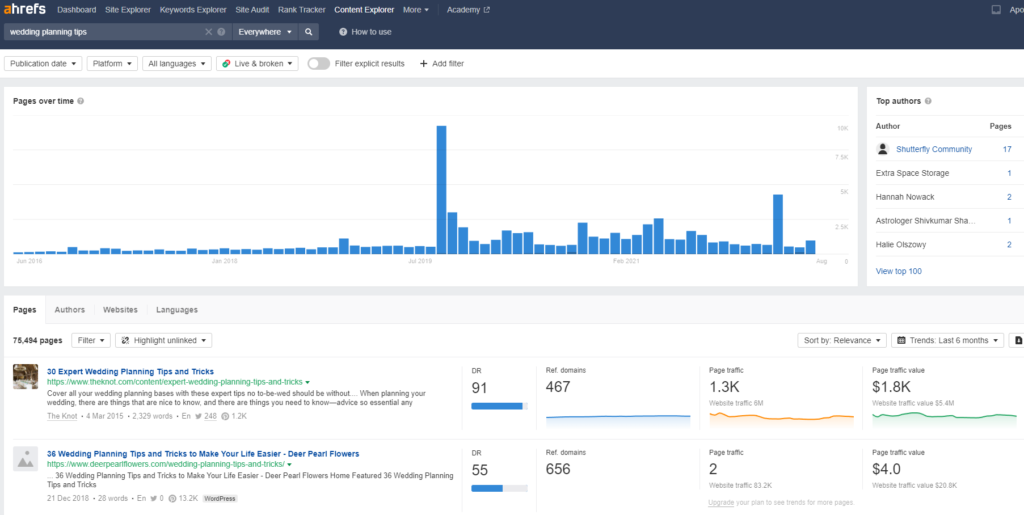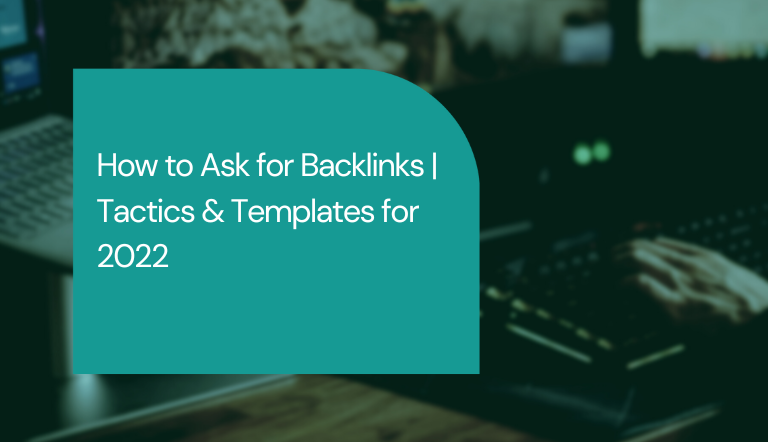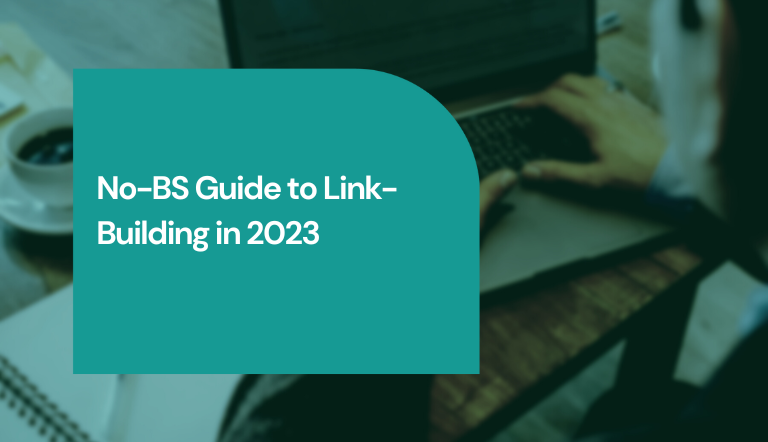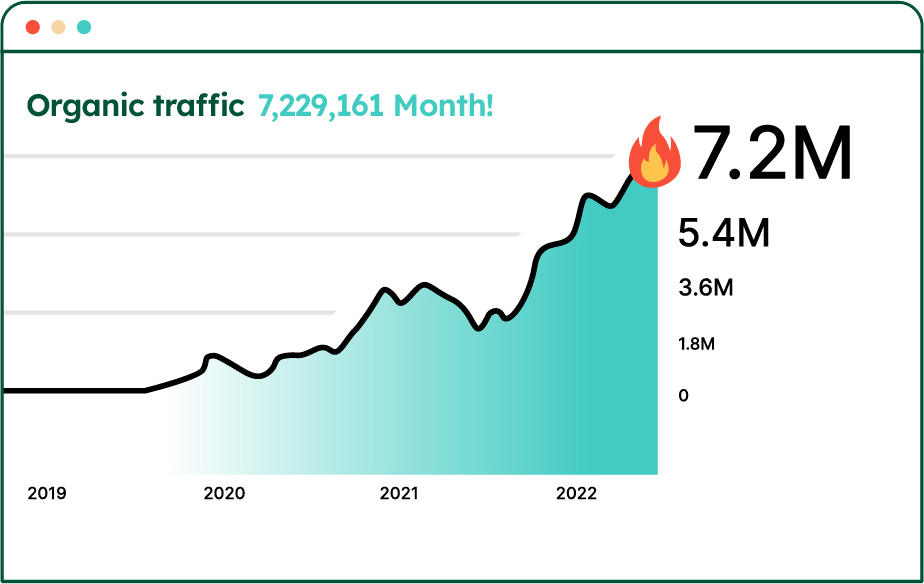Backlinks can have a very serious impact on your website’s SEO.
They can help you rank on page #1 of Google, get your web pages indexed faster, and even drive some traffic or leads to your website.
Link-building, however, is far from easy, and there’s a lot you should know if you want to be able to do it effectively.
In this article, we’re going to teach you all you need to know about asking for backlinks, including:
- What is a Backlink and Why is Link-Building Important
- Link-Building Best Practices for 2022
- 6 Email Templates for Asking for Backlinks
- Asking for Backlinks FAQ
Let’s dig in!
What is a Backlink & Why is Link-Building Important?
In simple terms, a backlink is when one website links to another.
Google looks at backlinks as a “voucher of trust” – if another site links to yours, they’re saying that “this is because the website is legitimate.”
The more high authority backlinks a website has, the more authoritative it looks to Google, and the more likely it is for the website to rank well.
In today’s SEO landscape, backlinks are all but essential if you want to perform well on Google.
In competitive niches where everyone already has a lot of quality content and an effective website, the primary differentiator between page #1 and page #10 is the number and quality of backlinks.
In less competitive niches, backlinks are the differentiator whether your website ranks in three months or one year.
Other than the SEO value, backlinks also come with several other benefits, such as:
- Referral traffic
- Faster indexing and ranking
- Increased domain authority
How to Ask for a Backlink in 3 Steps
#1. Creative Authority Content
First things first – no one wants to link to mediocre content.
If your blog posts are short-form (<500 words), badly written, impractical, and so on, the only chance you’ll have of building backlinks is if you pay for them.
Rule of thumb, when creating content targeting a specific keyword, look up the keyword on Google and see what ranks.
Your content should be as good or better than what’s ranking on top.
Now other than that, here are some other characteristics of high-quality blog content:
- Sufficiently long. It covers the topic effectively, answering any questions that the Googler might have.
- Visual. Includes graphics and images throughout the post.
- Practical. Avoids buzzwords or being vague about a topic without answering the reader’s questions.
- Insightful. Includes expert insight that other Google posts might not have.
#2. Prospect for Backlink Leads
Once you’ve got some quality posts on your blog, it’s time to do some prospecting.
At this stage, you’ll want to gather around 100 plus blogs that you’re going to ask for backlinks from.
Now, there are a ton of different ways to do this.
You can, for one, use Google to find websites in your target niche. For example, if you’re in the weddings niche, you can look up topics like:
- Wedding planning tips
- Best wedding songs
- Wedding invitation templates
Simply plug the keyword into Google:

And extract anyone that ranks on pages one through ten (or whichever page runs out of relevant results).
Alternatively, if you’re using a paid tool like Ahrefs, you can plug your keyword into their Content Explorer and find a ton of pages that cover this topic:

#3. Send Your Outreach Email
Finally, it’s time to send your outreach email.
Of course, you can’t just do something like:
“Hey dear website owner, can I please have a backlink? Thank you very much!”
You actually need to give the website owner a reason for giving you that backlink.
Now, there are a lot of options here, but some of the most popular ones are:
- Quality Content or Outdated Information. The page you’re asking for a link to is superior to whatever they’re already linking to, or it has more up-to-date information.
- Broken Link. One of the outgoing links in their existing article is broken and you’re offering them a quick fix – to replace the broken link with yours.
- Backlink Exchange. You’re offering the site owner a backlink in exchange for the one you’ll be receiving.
- Guest Post Pitch. You pitch a topic that the website hasn’t covered so far, and you offer to write it for them. This works particularly well if the topic is something you personally specialize in.
- Sponsored Backlink Offer. You offer a certain amount of money in exchange for the link placement. While this is against Google’s terms of service, it IS a valid technique in a lot of competitive niches.
Below, we’ll give you templates for each of these types of offers, but first, let’s talk about some best practices.
Link-Building Best Practices (That You Should Know)
There are a lot of things you can get right or wrong when it comes to asking for backlinks.
Here are some of the best practices you should be following when executing a link-building campaign:
#1. Pick the Right Prospects
Chances are if you’re reaching out to Forbes or some other big media, they’re not really going to care about whatever you might have to say in your email. Reaching out to a small blog, though, is going to be a lot more effective.
At MintSEO, we always exclude big websites like HealthLine, Neil Patel, Backlinko, and so on from our outreach lists, as it’s basically guaranteed they won’t reply.
#2. Pick the Right Point of Contact
Who you’re reaching out to matters. E.g. if you’re contacting a small business, you can reach out to the founder. Big company? Then you should get in touch with their content or SEO lead.
Here’s a small cheat sheet on who your point of contact should be by priority (in descending order):
- Content or SEO Lead (or anyone in charge of the blog)
- Marketing Executive
- Marketing Lead
- CMO or Head of Marketing
- Founder (if it’s a small startup or a solo blog)
#3. Personalize Your Outreach Emails
The more generic your outreach emails look, the more likely it is that you’re going to get ignored.
Emails like this, for example, just don’t ever work:
“Hey, I found your blog on the internet, and I really liked your content quality! I also have a blog on [Topic] and I wanted to ask if I can get a backlink from your site.”
Now, if you were sending something like this, you’d stand a much bigger chance of getting a response:
“Hey [Name],
I found your blog while looking for resources on [Topic]. I really like your take on [Subject], and I thoroughly enjoyed reading your posts about [Topics].
I’m actually a fellow blogger in the [Topic] niche, and I wanted to reach out and see if there’s any way we can collaborate in the future.”
#4. Use a Dedicated Outreach Email
You should never use your main company email for asking for backlinks.
As you’ll need to send hundreds of emails per month for link-building, this might end up getting your company email domain penalized, leading to some of your emails ending up lost in spam.
This can be very harmful if you use email to communicate with your coworkers or clients.
So, when doing link-building outreach, we recommend you create a spin-off email specifically for outreach.
E.g. if your company’s email domain is @marketing.com, your outreach email could be @marketingoutreach.com.
#5. Asking for Backlinks is a Numbers Game
At the end of the day, even if your email copy is impeccable and you’re picking the best leads, there are still a lot of factors outside your control.
Deliverability is one – some of your emails are bound to bounce, end up in the “Promotions” tab, or even get flagged as spam.
Circumstances are another – you never know what the person receiving the email is up to. They might just not notice your email or they might be busy for the week, and hence, they might not reply.
So, if you want to get really good results from asking for backlinks, you should be sending hundreds of emails per month to account for all the emails that are not going to work.
#6. Sometimes, It’s OK to Pay for Links
Sometimes, you’re going to receive a counteroffer – they’re going to link to your website, but you’ll have to pay a one-time fee.
While this is against Google’s terms of service, it IS a standard in some niches.
If you’re in any of the following niches:
- CBD
- VPN
- Gambling
- Insurance
No one is going to link to your website for free.
#7. Avoid Link Farms
A link farm is a website that’s created for the sole purpose of selling backlinks.
Such websites often show characteristics like:
- Lots of outgoing links
- A high number of published guest posts
- Dozens of random categories
- Dedicated “Write for Us” page
- Short-form, useless content
- High domain authority, but low website rankings
Backlinks from link farms have almost no effect on your site.
In the best-case scenario, Google will disregard links from these websites completely.
Worst case, you’ll get penalized for trying to game the algorithm.
6 Email Templates for Asking for Backlinks (in 2022)
Looking for inspiration on your outreach email copy?
We’ve got your back!
Check out our top 6 email templates for asking for backlinks (to inspire yours).
#1. Authority Content Email Template
Hey [Name],
I found your article on [Topic] while looking for information on [Keyword]. It was a very interesting read, thanks for that!
In your post, I noticed that you link to [Low-Quality Resource], which is a bit outdated. The article… [Whatever is Wrong with the Link].
I actually recently created a more up-to-date resource on the topic [Link], which covers interesting things like:
- [Stats or Relevant Information]
Since you liked the [Original Article], thought you’d get a kick out of ours, too. Would love to hear your thoughts on it!
If you like the resource, we’d appreciate it if you could include a link to it in your post about [Topic].
Best,
[Name]
#2. Link Exchange Email Template
Hey [Name],
I just stumbled on your blog while looking up [Topic]. As a fellow blogger in the [Niche] space, I wanted to say how much I like your [Compliment About Blog Post, Website, Opinion on a Topic, etc.].
Thought I’d reach out, say hi, and maybe see if there are any opportunities in collaborating between our blogs.
I was thinking, we could do a small link exchange to boost each other’s Google rankings. Maybe you could link to [Link] in your post here [Their Link], and I could get you a link from our own website [Link]?
Best,
[Name]
#3. Broken Link-Building Email Template
Hey [Name].
I just stumbled across your post about [Topic], and I gotta say, I’m very impressed with the quality of content on your site!
I spotted a minor error, though, so thought I’d reach out and let you know. In this post [link], you’re linking to a resource by [Blog Name] about [Topic].
From the looks of it, [Website] is no longer operational, and the page you’re linking to is down. Thought I’d bring this to your attention, as Google doesn’t like it when you’re linking to blank pages.
If you’re looking for a quick fix, by the way, I actually wrote a similar post a while back, so you could maybe plug in my link, instead of having to do some rewriting on the post.
Best,
[Name]
#4. Guest Post Request Email Template
Hey [Name],
I found your website while looking for sites in the [Topic] niche. I really loved your coverage of [Topic], and I was wondering if you guys are open to guest posts.
I went through your recent posts, and came up with 3 potential guest post ideas:
- Topic
- Topic
- Topic
Does any of these fit your blog’s brand? If so, I can send over an outline to get your approval before getting started on the post.
Best,
[Name]
#5. Unlinked Mention Email Template
Hey [Name],
I just saw that you mentioned our brand, [name], on your website and I wanted to reach out and thank you for that!
We really appreciate it 🙂
One minor hiccup, though, there’s no link back to our site where our brand is mentioned. Would it be possible to get that fixed?
Thanks so much in advance,
[Name]
#6. Paid Backlink Request Email Template
Hey [Name],
I found your website while looking up bloggers in the [Topic] niche, and I was thoroughly impressed by how well you cover the topic.
I wanted to reach out for a small sponsorship opportunity – we’re willing to send over X USD in exchange for a quick mention on your blog on this article here: [Link]
Best,
[Name]
How to Ask for Backlinks FAQ
Do you still have some questions on link-building? You’ll find your answers below.
#1. How to ask for backlinks in an email?
To effectively ask for a backlink in an email, give the outreach prospect something in return. Some things that you can offer for a backlink are:
- A more up-to-date article than whatever they’re currently linking to.
- Fix a broken link on their site.
- Free product or service for their site or business.
- Sponsorship fee.
- Backlink exchange.
#2. Should you ask for backlinks?
Yes, if you want your website to rank well in a reasonable timeframe, you should be actively asking for backlinks. On a weekly basis, create a list of outreach prospects and reach out by asking for backlinks.
#3. How to get backlinks for free?
To get backlinks for free, make sure to give the outreach prospect a good offer, such as a link exchange, quality guest post, up-to-date resources, and so on.
#4. How long does it take for backlinks to work?
Backlinks can kick in within two months to one year after publishing them. The timeframe depends on the quality of the website you’re getting a backlink from, how many backlinks your website already has, and how qualitative your content is.
#5. Should I pay for backlinks?
If the backlink is from a quality website, and you have the budget for it, then yes, you should pay for a backlink. If the website is a link farm or a PBN, though, then you should avoid it at all costs.





